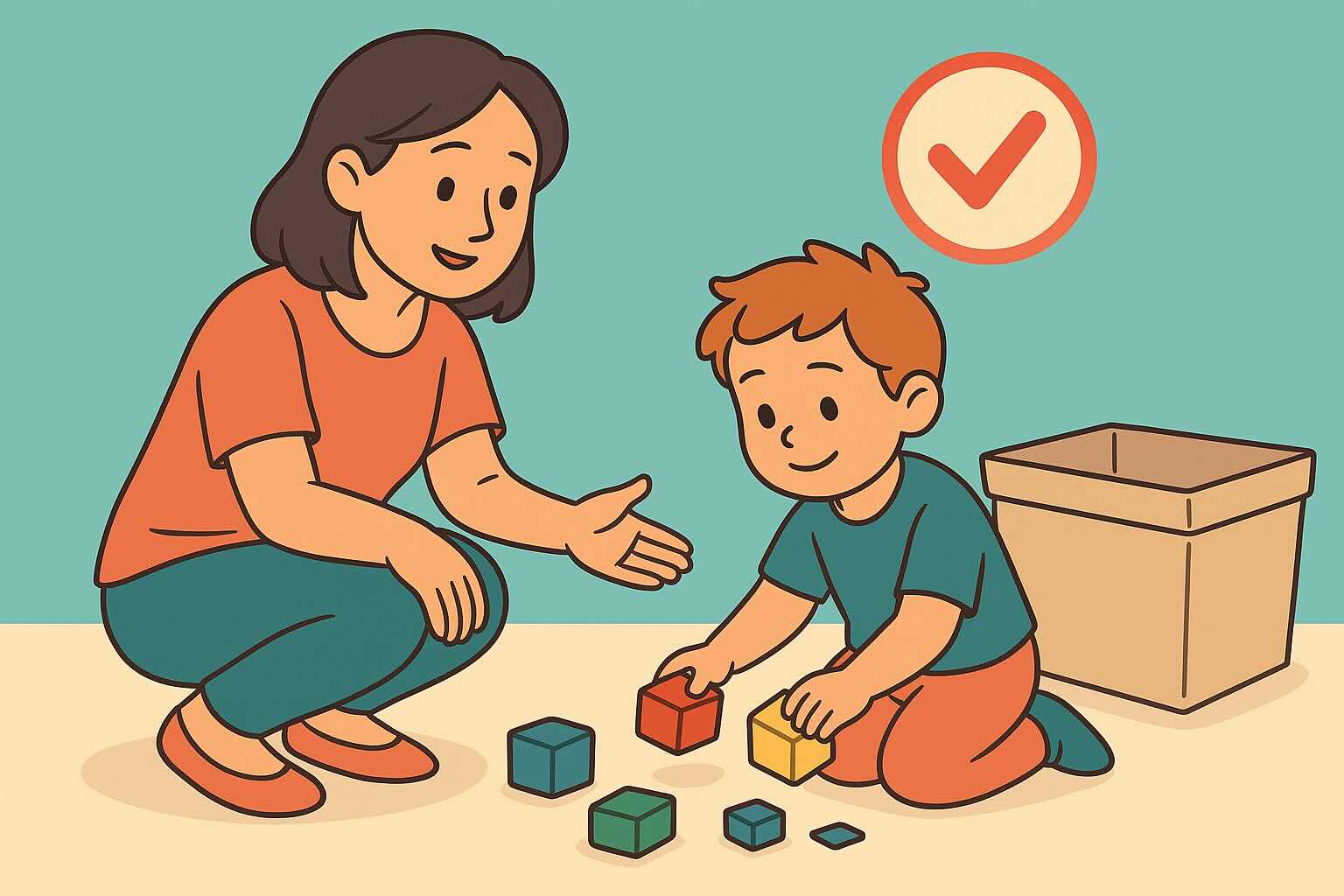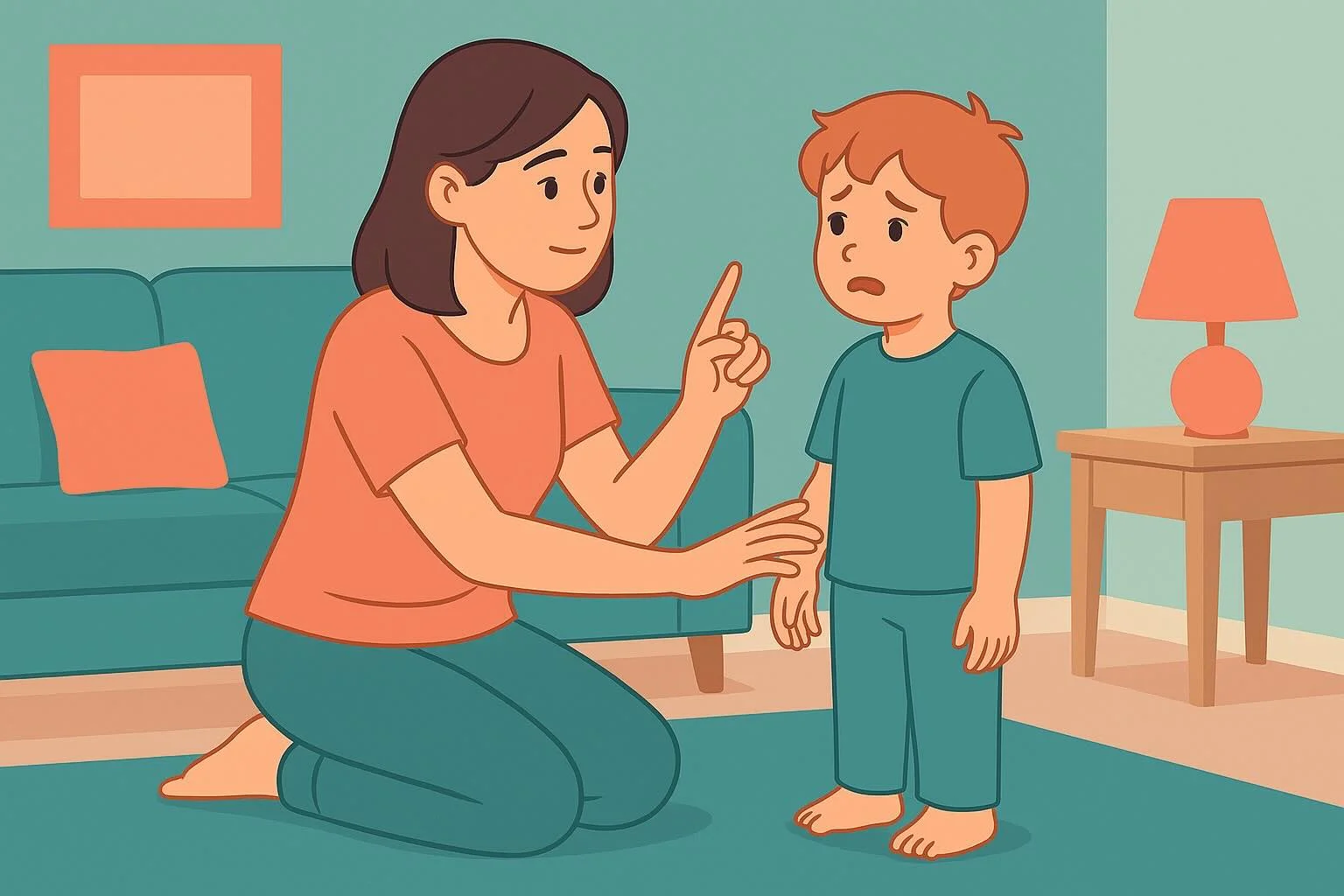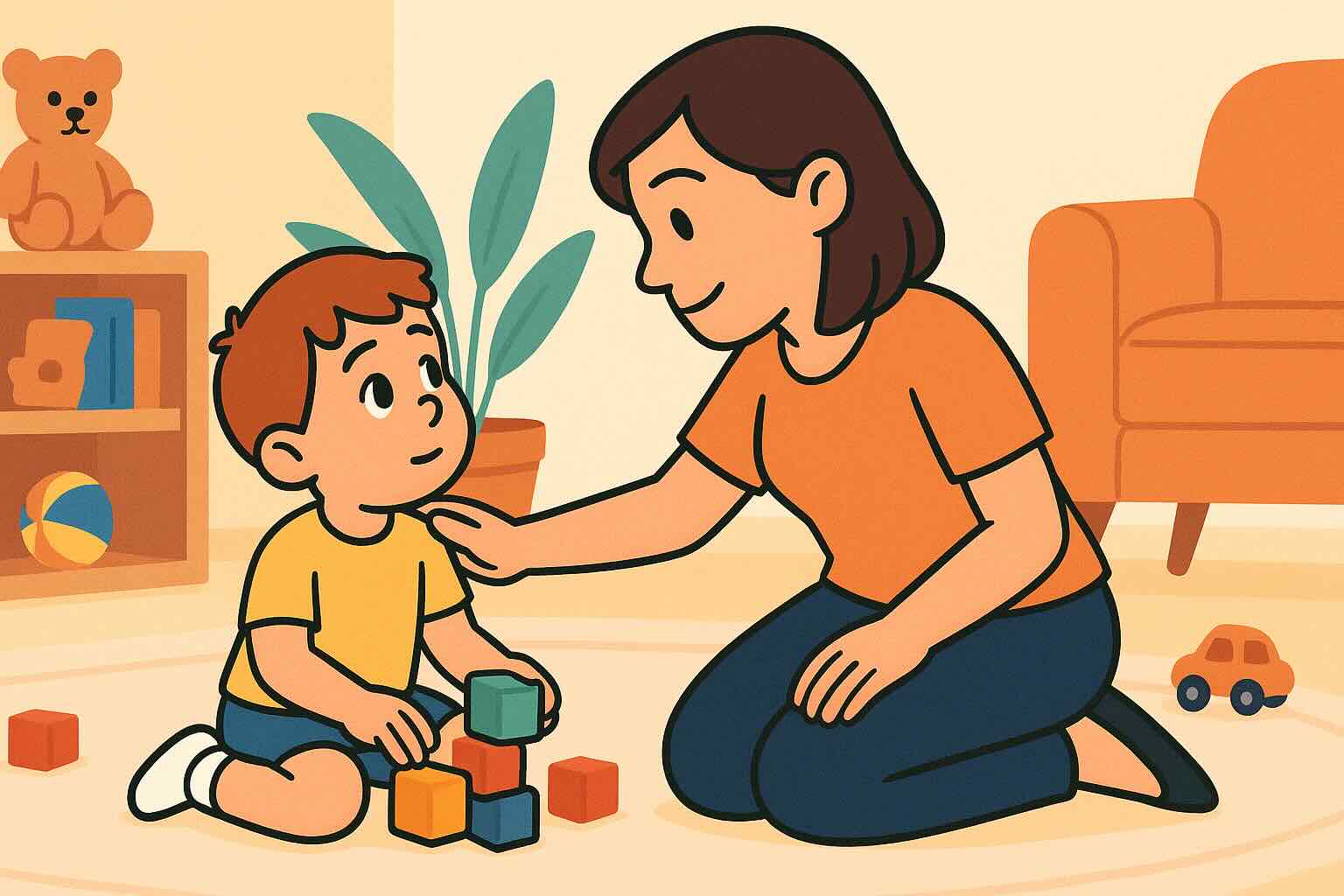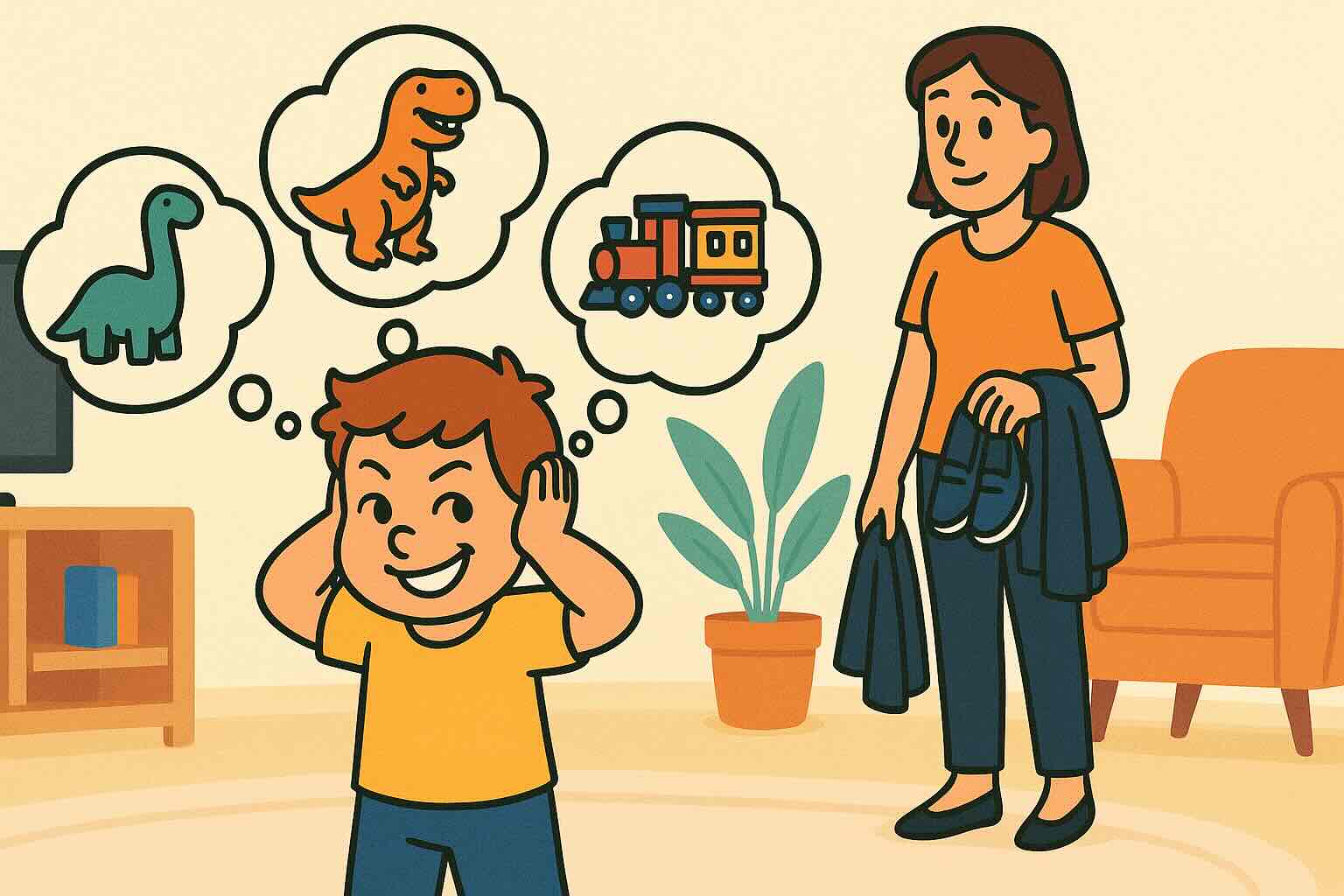Building Cooperation Without Rewards: 7 Ways


If your child only cleans their room for sticker chart stars, helps with chores for screen time, or shares toys for praise, you might be wondering: "Is this really teaching them to be a caring, responsible person?" The answer is likely no. While reward systems might create short-term compliance, they often undermine the intrinsic motivation that leads to genuine cooperation and character development.
This comprehensive guide will show you how to build lasting cooperation through connection, clear expectations, and fostering your child's natural desire to contribute - without relying on external rewards that can backfire over time.
What You'll Learn in This Guide
- The Science of Intrinsic Motivation - Why internal motivation is more powerful and lasting
- When Reward Systems Backfire - Understanding the hidden costs of sticker charts and prizes
- The Three Pillars of Natural Cooperation - Autonomy, mastery, and purpose in daily life
- Age-Specific Cooperation Strategies - Different approaches for 3-4 vs. 5-7 year olds
- Transitioning Away from Reward Systems - How to rebuild intrinsic motivation
- Building Family Contribution Culture - Creating an environment where everyone wants to help
- Handling Resistance Without Bribes - Practical strategies for common cooperation challenges
Estimated reading time: 14 minutes
The Science of Intrinsic vs. Extrinsic Motivation
How Children's Natural Motivation Works
Children are born with an innate desire to master skills, contribute to their community, and feel capable and valued. This intrinsic motivation is incredibly powerful when it's nurtured and protected.
Research shows that intrinsic motivation leads to:
- Better performance on complex tasks requiring creativity and problem-solving
- Greater persistence when challenges arise
- Higher satisfaction and sense of wellbeing
- Better relationships based on genuine care rather than transaction
- Stronger character development and moral reasoning
The Hidden Costs of External Reward Systems
While rewards might seem to work in the short term, research consistently shows that they can undermine the very behaviors parents are trying to encourage.
Problems with reward-based systems:
- Decreased intrinsic motivation: Children lose interest in activities once rewards are removed
- Transactional relationships: "What do I get?" becomes the default question
- Reduced creativity and problem-solving: Focus shifts to earning rewards rather than mastering skills
- Increased pressure and anxiety: Performance becomes tied to external validation
- Dependency on external motivation: Children struggle to self-motivate without rewards
The Overjustification Effect
This psychological phenomenon occurs when external rewards actually decrease a person's intrinsic motivation to perform a task. When children receive rewards for activities they already find enjoyable or meaningful, they may begin to see the activity as work rather than something inherently worthwhile.
Example: A child who enjoys helping in the kitchen may lose interest if they start receiving stickers for cooking assistance, because their brain begins to attribute their helpfulness to the reward rather than their natural enjoyment of contributing.
When Reward Systems Seem to Work (But Don't Really)
The Compliance vs. Cooperation Distinction
Many parents report that reward systems "work" because they see immediate behavior change. However, there's an important distinction between compliance and genuine cooperation.
Compliance: Doing what's asked to earn rewards or avoid consequences
- Motivated by external factors
- Temporary and situation-dependent
- Doesn't generalize to new situations
- Can create resentment over time
Cooperation: Choosing to help because you understand why it matters
- Motivated by internal values and connection
- Lasting and transferable
- Applies across different contexts
- Builds character and relationships
Why Quick Fixes Backfire Long-Term
Reward systems often provide quick behavior changes that feel successful to parents, but these changes rarely last or transfer to new situations.
The reward dependency cycle:
- Child cooperates for reward
- Parent sees "success" and continues system
- Child's intrinsic motivation decreases
- Cooperation drops when rewards aren't available
- Parent increases rewards to maintain compliance
- Child becomes increasingly dependent on external motivation
The Three Pillars of Natural Cooperation
Research identifies three basic human needs that, when met, foster intrinsic motivation and genuine cooperation: autonomy, mastery, and purpose.
Pillar 1: Autonomy - The Need for Choice and Control
Children cooperate more readily when they feel they have some control over their environment and choices in how they contribute.
Ways to foster autonomy:
- Offer meaningful choices: "Would you like to set the table or feed the dog?"
- Involve them in rule-making: "What should happen if toys don't get put away?"
- Respect their input: "You have an idea about how to solve this problem"
- Allow age-appropriate independence: Let them do tasks their way when possible
Pillar 2: Mastery - The Drive to Get Better at Things
Children have a natural desire to develop competence and skill. When we focus on growth and learning rather than perfect performance, cooperation increases.
Ways to support mastery:
- Focus on effort over outcome: "You worked really hard on cleaning your room"
- Notice improvement: "You're getting faster at putting on your shoes"
- Teach skills gradually: Break down tasks into manageable steps
- Celebrate problem-solving: "You figured out a way to reach that shelf!"
Pillar 3: Purpose - Understanding Why It Matters
Children cooperate more when they understand how their actions contribute to something larger than themselves - their family, community, or values they care about.
Ways to build sense of purpose:
- Connect actions to family values: "When we all help, our home feels peaceful"
- Show impact on others: "Your sister felt so happy when you shared your toy"
- Explain the "why": "We clean up so we can find things and our home feels welcoming"
- Highlight contribution: "Our family works so well when everyone helps"
Age-Specific Cooperation Strategies
Ages 3-4: Building the Foundation of Contribution
Young children are naturally eager to help but need structure and support to be successful. Focus on building positive associations with contributing rather than perfect performance.
Effective strategies for 3-4 year olds:
Making helping appealing:
- Work together: "Let's clean up the blocks together!"
- Make it playful: Sing songs, race the timer, create games around tasks
- Use simple language: "Time to feed our family by setting the table"
- Offer appropriate choices: "Would you like to carry the spoons or the napkins?"
Building competence:
- Start small: Simple, achievable tasks that build confidence
- Provide tools: Step stools, child-sized cleaning supplies
- Be patient: Expect messes and imperfection while they learn
- Celebrate effort: "You worked so hard to help our family!"
Common cooperation opportunities:
- Putting toys in designated spots
- Carrying safe items to different rooms
- Feeding pets (with supervision)
- Simple food preparation tasks
- Sorting laundry by color
Ages 5-7: Developing Responsibility and Initiative
Children this age can understand more complex explanations about why cooperation matters and can take on greater responsibility for family functioning.
Effective strategies for 5-7 year olds:
Building understanding:
- Explain family systems: "Everyone in our family has ways they help keep things running smoothly"
- Connect to bigger picture: "When you make your bed, it helps our whole house feel organized"
- Problem-solve together: "What would happen if nobody helped with dishes?"
- Share decision-making: "How should we divide up the chores this week?"
Increasing responsibility:
- Natural progression: Gradually increase complexity and independence
- Ownership opportunities: "This is your responsibility" rather than "Do this for a reward"
- Real consequences: Let them experience what happens when they don't follow through
- Acknowledgment of capability: "You're becoming so responsible and helpful"
Common cooperation opportunities:
- Independent morning and bedtime routines
- Preparing simple meals or snacks
- Caring for plants or pets
- Organizing and maintaining their own spaces
- Contributing to family activities and outings
Practical Strategies for Common Cooperation Challenges
Challenge 1: "I don't want to clean up my toys"
Reward-based approach: "If you clean up, you'll get a sticker/treat/screen time"
Intrinsic motivation approach:
- Connect to their values: "When toys are put away, you can find them easily tomorrow"
- Offer autonomy: "Would you like to clean up the blocks first or the art supplies?"
- Work together: "I'll help you get started, then you can finish"
- Problem-solve: "What makes cleaning up hard? How could we make it easier?"
Scripts that work:
- "Our toys last longer when they're cared for"
- "A clean room feels peaceful for sleeping"
- "When everything has a home, we can find what we need"
Challenge 2: "Why do I have to help with chores?"
Reward-based approach: "Because you'll earn money/privileges/treats"
Intrinsic motivation approach:
- Explain family systems: "Families work best when everyone contributes"
- Show impact: "When you set the table, it helps me finish cooking so we can eat together"
- Connect to growth: "Learning to take care of things helps you become more independent"
- Highlight capability: "You're old enough to be a real helper in our family"
Scripts that work:
- "Everyone in our family has ways they help"
- "You're becoming so capable and responsible"
- "Our home feels happy when we all work together"
Challenge 3: Forgetting or avoiding responsibilities
Reward-based approach: Charts, reminders tied to rewards, consequences tied to privileges
Intrinsic motivation approach:
- Natural consequences: Let them experience what happens when tasks aren't done
- Problem-solving: "You forgot to feed the dog and he was hungry. What could help you remember?"
- Environmental support: Set up systems that make remembering easier
- Ownership: "This is your responsibility. How do you want to handle it?"
Scripts that work:
- "I notice the dog bowl is empty. What do you think he needs?"
- "You forgot your lunch again. What could help you remember tomorrow?"
- "Your room looks like it needs attention. What's your plan?"
Transitioning Away from Existing Reward Systems
The Gradual Transition Process
If you've been using reward systems, don't stop them cold turkey. A gradual transition helps children rediscover their intrinsic motivation without feeling confused or abandoned.
Week 1-2: Reduce frequency
- Space out rewards more (every other day instead of daily)
- Begin adding non-reward acknowledgments: "You really concentrated on that"
- Start asking about their own feelings: "How did it feel to help your sister?"
Week 3-4: Shift focus
- Emphasize the activity itself: "You seemed to enjoy organizing your books"
- Connect to family impact: "Your help made dinner time so much smoother"
- Ask for their input: "What do you think about how chores are going?"
Week 5-6: Phase out rewards
- Stop formal reward systems
- Continue acknowledging effort and contribution
- Focus on internal satisfaction: "You must feel proud of how hard you worked"
Handling "What do I get?" Questions
When children ask what they'll get for cooperating, it's an opportunity to redirect toward intrinsic motivation.
Helpful responses:
- "You get the good feeling of helping our family"
- "You get to see how capable and helpful you are"
- "You get a clean room that feels peaceful"
- "You get the satisfaction of taking care of things you care about"
Rebuilding Intrinsic Motivation
Focus on these elements:
- Process over product: "You thought carefully about how to solve that problem"
- Effort over outcome: "You kept trying even when it was difficult"
- Growth over perfection: "You're getting better at remembering your responsibilities"
- Impact over compliance: "Your help made such a difference for our family"
Building a Family Culture of Contribution
Creating Systems That Support Natural Cooperation
Environmental supports:
- Organize spaces so children can be independent
- Provide appropriate tools (step stools, child-sized supplies)
- Create visual reminders that support rather than control
- Make cooperation easier than non-cooperation
Routine supports:
- Build helping into daily rhythms rather than making it extra
- Work together when possible rather than assigning isolated tasks
- Create predictable expectations so children know what to expect
- Allow time for children to contribute without rushing
The Language of Cooperation
How you talk about contribution and cooperation significantly impacts your child's motivation.
Language that builds intrinsic motivation:
- "Our family works well when everyone helps"
- "You're becoming so responsible and capable"
- "I can see you really care about our home"
- "Your contribution makes such a difference"
Language that undermines intrinsic motivation:
- "Good job!" (generic praise)
- "If you do X, you'll get Y" (transactional)
- "You're such a good helper!" (labeling)
- "I'm proud of you" (external validation)
Family Meetings and Shared Decision-Making
Regular family meetings help children feel ownership over family functioning and cooperation expectations.
Effective family meeting elements:
- Problem-solving together: "How can we make morning routines smoother?"
- Sharing appreciation: "I want to thank everyone for..."
- Planning together: "What needs to happen to get ready for our camping trip?"
- Evaluating systems: "How is our new bedtime routine working?"
Handling Resistance Without Bribes or Threats
Understanding the Root of Resistance
When children resist cooperating, there's usually an underlying reason that needs attention.
Common reasons for resistance:
- Feeling controlled rather than autonomous
- Lacking skills to complete the task successfully
- Not understanding why the task matters
- Feeling disconnected from family or overwhelmed
- Needing attention or connection from parents
The PEACE Approach to Resistance
P - Pause: Don't react immediately to resistance E - Empathize: "It seems like you really don't want to clean up right now" A - Ask: "What's hard about this?" or "What would help?" C - Collaborate: "How can we solve this together?" E - Encourage: "I believe you can figure this out"
Scripts for Common Resistance
"I don't want to!"
- "I hear that you don't want to. This still needs to happen. What would make it easier?"
- "You wish you didn't have to clean up. What's hard about it right now?"
"It's not fair!"
- "You think this isn't fair. Help me understand your thinking."
- "Fair is important to you. Let's talk about how we can make this feel fair."
"Why do I have to do everything?"
- "It feels like a lot to you right now. Let's look at how we can balance things better."
- "You're feeling overwhelmed. What would help you feel like the work is shared fairly?"
Teaching Problem-Solving and Initiative
Moving Beyond Compliance to Thinking
The goal isn't just cooperation - it's raising children who can think through problems and take initiative.
Questions that build thinking skills:
- "What do you notice needs to be done?"
- "How could we solve this problem?"
- "What would happen if...?"
- "What's your idea about how to handle this?"
Encouraging Initiative and Leadership
Ways to foster initiative:
- Notice and acknowledge when they help without being asked
- Ask for their ideas about family challenges
- Give them ownership over specific areas or problems
- Step back and let them figure things out when safe to do so
The Long-Term Vision: Raising Intrinsically Motivated Adults
What Cooperation Without Rewards Creates
Children who grow up with intrinsic motivation and genuine cooperation develop into adults who:
In relationships:
- Contribute because they care, not because they have to
- Take initiative to solve problems and help others
- Feel genuinely satisfied by making a positive difference
At work:
- Are self-motivated and creative problem-solvers
- Take ownership and responsibility without micromanagement
- Find meaning and satisfaction in their contributions
As parents:
- Model cooperation and contribution for their own children
- Create family cultures based on mutual care rather than control
- Understand how to nurture intrinsic motivation in the next generation
The Ripple Effect of Intrinsic Motivation
When you focus on building genuine cooperation rather than compliance, you're not just improving daily family life - you're contributing to raising a generation of people who:
- Care about others and want to contribute to their communities
- Take responsibility for problems and work toward solutions
- Find satisfaction in meaningful work and relationships
- Understand their own motivations and values
Your 6-Week Cooperation Building Plan
Weeks 1-2: Assessment and Foundation
- Observe current motivation patterns (intrinsic vs. extrinsic)
- Begin reducing reward frequency if using them
- Start focusing on the three pillars: autonomy, mastery, purpose
- Practice new language around cooperation and contribution
Weeks 3-4: Skill Building and Connection
- Implement age-appropriate cooperation opportunities
- Work on problem-solving resistance together
- Focus on building competence and confidence
- Strengthen connection through working together
Weeks 5-6: Integration and Refinement
- Phase out remaining reward systems
- Evaluate family systems and routines for cooperation support
- Address any remaining challenges with new approaches
- Celebrate growth in intrinsic motivation and initiative
Key Takeaways: Your Cooperation Without Rewards Guide
- ✅ Intrinsic motivation is more powerful and lasting than external rewards
- ✅ Autonomy, mastery, and purpose are the three pillars of natural cooperation
- ✅ Connection and understanding build cooperation better than bribes or threats
- ✅ Age-appropriate expectations set children up for success and confidence
- ✅ Process and effort matter more than perfect performance
- ✅ Family contribution culture makes cooperation feel natural and important
- ✅ Resistance often signals unmet needs rather than defiance
- ✅ Gradual transitions work better than sudden changes in motivation systems
- ✅ Long-term character development is more valuable than short-term compliance
Remember: Your goal isn't to control your child's behavior through rewards and punishments - it's to nurture their natural desire to contribute, grow, and care for others. Genuine cooperation comes from the heart, not from a sticker chart.
Related Articles
Looking to build on these cooperation strategies? Check out these related articles:
- How to End Power Struggles with Children Ages 3-7 - Transform battles into collaboration with connection-based solutions
- Setting Boundaries Without Punishment: Complete Guide - Learn to set firm, loving limits that teach responsibility
- Natural Consequences vs Punishment: Teaching Responsibility - Discover how natural consequences teach better than imposed punishments
- Time-In vs Time-Out: Building Connection and Self-Regulation - Build emotional regulation through connection rather than isolation
This article is based on self-determination theory, intrinsic motivation research, and positive discipline principles. Individual experiences vary based on child temperament, family circumstances, and consistency of implementation. Consider your family's unique needs when implementing these strategies.
24/7 AI Parenting Assistant
Get instant, personalized advice with expert-curated parenting knowledge. Chat with your AI coach anytime, anywhere.

Boundary Setting Scripts
Set firm, loving boundaries without punishment using evidence-based scripts and strategies that build cooperation and respect.
Frequently Asked Questions
Need personalized support?
RootWise's AI coach can provide tailored strategies for your specific situation, available 24/7 when you need it most.
Learn More About AI Coaching →



